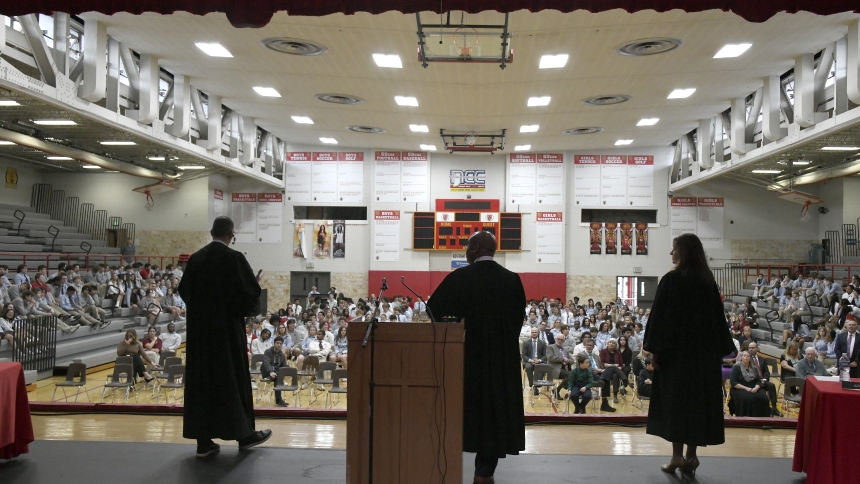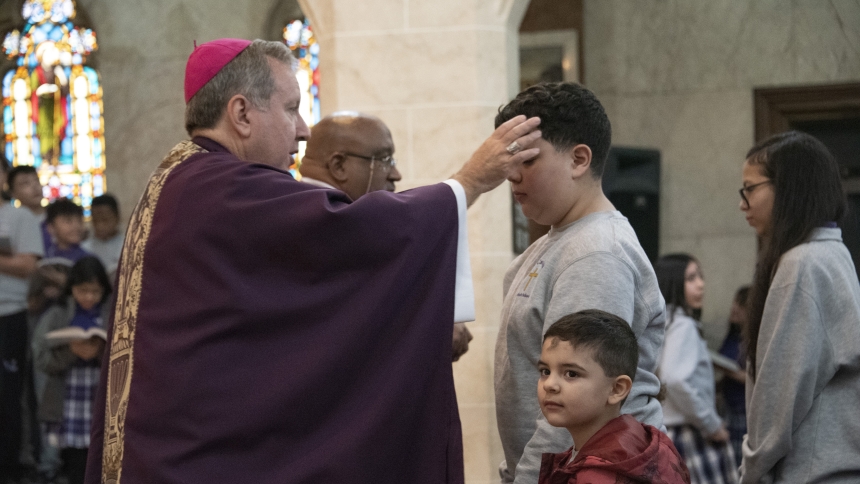
MERRILLVILLE – The gymnasium became a courtroom and students’ conversations with lawyers and judges in the library resembled an introductory law class. Each of the unique experiences was courtesy of the Appeals on Wheels program that rolled through Andrean High School on March 14.
Offered as an educational outreach and working demonstration in civics by the state’s Court of Appeals, the visit by judges from Indianapolis was a source of pride for AHS administrators and an annual event that drew the curiosity and courtesy of students.
The entire student body gathered in the gym to witness real proceedings – presentations by attorneys from the defense and prosecution, along with questions by three judges – for a case brought to the court of appeals by a woman convicted by a lower court of cruelty to an animal through abandonment.
Before 59ers watched the proceedings, a select group of students met in the library with state Court of Appeals judges Peter Foley, Rudolph Pyle and Elizabeth Tavitas. Local legal professionals sat at small round tables as they shared personal stories and answered questions on matters of law.
Jack Ziegelhofer shared lunch and conversations with judge Pyle. The AHS sophomore said he found the visitor to be engaging and open about sharing how he went from police work to eventually sitting on the bench for the second-highest court in the state.
“He also went over his life story, like how he came to be in the position he’s in now,” explained Ziegelhofer. “It was really interesting: he started off as a state trooper and from that he realized how much he (respected) the law. He went to law school and evolved into his position, making various connections.”
Andrean principal Jaycob Knazur said the school is proud to be an ongoing partner with the court’s educational initiative. Confident that his students would keep a high standard of decorum, he visited the library and was present in the gym in the spirit of “trust but verify.”
Freshman Samuel Gibson conducted a cross-examination of sorts with Pyle, looking to discover the vocational motivations of the judge and how decisions are rendered in the courtroom. He said the legal minds put them at ease to be informal and “pick their brains.”
“We asked how it became appealing to him to go to law school, and more so about the court process and how it plays out,” explained Gibson. “We asked (about) the difference between how a judge prepares for a case and how a lawyer prepares.”
At the informal meeting with students, Stephen E. Scheele, a judge for the Lake County Superior Court in Hammond, spoke with students about issues he believes are foremost in the minds of many citizens.
“Even if students are not interested in the court system, gaining a familiarity with it …in turn, promotes a greater confidence in the legal system, which is important,” said Scheele, who was appointed to the bench by Governor Eric Holcomb in 2019.
“Fundamentally, the rule of law is what governs society,” Scheele explained. “We all have and should have that fundamental right to know that we are going to be safe in our persons, and we’re going to be safe in our properties … or I won’t be injured or hurt on my way there because of unlawful activities afoot.”
In summary, the case featured before the 59ers audience, Linda Newman v. State of Indiana, concerns the alleged abandonment of domestic animals by Newman “during a contentious divorce,” according to the Court of Appeals of Indiana. She was convicted of cruelty to an animal, a Class A misdemeanor. The resident, through her attorney, argues that there is insufficient evidence to sustain the ruling and that it is “inappropriate in light of the nature of her offense and her character.”
After a brief introduction, the three-judge panel ensconced themselves behind a large table on stage, trimmed with Andrean signage. Taking notes and operating audio-visual equipment, clerks followed the proceedings as attorneys for the prosecution and defense presented. Of the judges, Foley presented the lawyers with the most questions.
At the conclusion of the appeals court hearing, the judges moved to the front of the stage to respond to a peppering of questions – some on the topic of current events, some eliciting laughter, but none pertaining to case specifics. One student inquired about legal processes to better understand how evidence is weighed in a courtroom.
“This court case was unlike the other Appeals on Wheels cases that we had done in the past. While it could seem like it was less of an important case, less serious, I had never seen (the court) question the law to the scale that they did,” said Avery Thomas, AHS junior, and a graduate of St. Margaret of Scotland School in Chicago.
In the court proceeding, the categorization of animals involved a line of questioning about “vertebrates.” Thomas wanted to know what that level of scrutiny may suggest about the hearing.
“I concluded that in each case, as one of the answers the judges gave me, was that the point was to question the law. That’s how a person defending the client comes to a conclusion that they can win that case,” Thomas concluded.
Audrey Cisneros, an Andrean freshman, said, “I’ve always wanted to go into law, and seeing this was really an eye-opening experience of how it is run.”
A graduate of Clark Middle School in St. John, Cisneros asked the judges what educational and practical pursuits she should prioritize “to get to their level of experience.”
Hearing their advice about pre-law programs and creative pursuits, she was happy to realize that she was already working on some of those areas.
“I learned that writing (experience) and history (studies) are important topics to take into consideration,” said Cisneros, who is an aspiring writer.
For the featured Newman case, the state’s mycase.IN.gov website posts updates searchable by the docket number: 23A-CR-2329.
Caption: Court of Appeals of Indiana judges Peter Foley (left), Rudolph Pyle (center) and Elizabeth Tavitas (right) field questions from students as part of the Appeals on Wheels program that held court in the Andrean High School gymnasium in Merrillville on March 14. The educational initiative sponsored by the state court returned to the Home of the 59ers to promote knowledge of the law and the processes of courts. (Anthony D. Alonzo photo)


